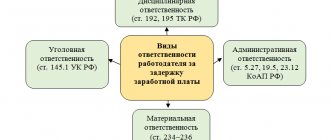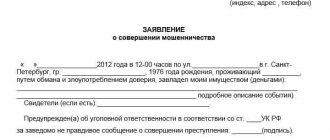If an employee’s labor rights are violated, he has the right to file a complaint with the supervisory authority against the employer. To protect their interests, they turn to the labor inspectorate, the prosecutor's office, and the court. It is important to fill out the application correctly, indicate all the necessary data, and attach supporting documents. We'll tell you how to write a complaint to the prosecutor's office against an employer about violation of labor rights and how to send it to the department.
- Form and sample
- Online viewing
- Free download
- Safely
FILES
What the law says
In accordance with Art. 1 of Federal Law No. 2202-1 of January 17, 1992, the prosecutor’s office in the Russian Federation supervises compliance with laws. That is, you can contact the prosecutor’s office regarding any violation of the law.
According to Art. 10 of the same law, inaction, which includes non-payment of earnings, is grounds for appealing to this government agency.
The procedure for considering citizens' appeals is specified in Federal Law No. 59 of 05/02/2006 and the industry instruction approved by order of the Prosecutor General's Office No. 45 of 01/30/2013. It states (clause 3.1) that the application can be forwarded to another body in accordance with their competence.
IMPORTANT!
The law does not oblige a citizen to appeal the employer’s inaction in a specific government agency, where to write a statement about non-payment of wages, the citizen decides for himself. The choice is between the prosecutor's office at the location of the employer or employee (if the appeal is submitted to the authority not in accordance with its competence, it is redirected), the labor inspectorate, the supervisory authority and the court.
When and how to apply
Documents can be submitted in person to the reception desk. They will put an acceptance mark on your copy.
If personal submission is not possible, send by mail with a list of the attachments and a receipt.
Documents are submitted electronically through the State Services service or on the prosecutor’s office website.
The Gosuslugi portal and department websites (depending on the region) contain instructions on how to submit an application to the prosecutor’s office against an employer for non-payment of wages. If a special form is not available, submit as a regular request using the standard forms offered by the site.
The appeal is sent to the prosecutor of the district, city or region (territory). The deadline for applying to the prosecutor's office is not established by law; for applying to the court it is one year from the date of the stipulated period for payment of the specified amounts in accordance with Art. 392 Labor Code of the Russian Federation.
How to write an appeal to the prosecutor's office
A unified application form has not been developed. There are no step-by-step instructions on how to write a statement to the prosecutor's office about non-payment of wages; it is drawn up according to the general rules of office work and the requirements set out in Art. 7 FZ-59.
Required details:
- name of the government agency;
- information about the applicant;
- mailing address;
- the essence of the appeal, what the violation of rights and laws consists of;
- signature and date.
There are three parts of the complaint: introductory, main (or descriptive) and final, operative.
IMPORTANT!
Anonymous applications are not considered by government agencies. The prosecutor's office accepts collective applications from several citizens on a general basis.
To make your complaint more convincing and help solve the problem, study court decisions on similar cases. The database of judicial practice in ConsultantPlus will help you find them (get free access to it by clicking on the link below). The database contains decisions of all Russian courts, and the search is as simple as in Yandex. Be sure to refer in the text of the appeal to those cases that the court decided “in your” favor.
Introductory part
This is a header located in the upper right corner of the sheet with factual data about the addressee and applicant, document:
- name of the prosecutor's office, last name, first name and patronymic of the prosecutor and his position (the second is optional);
- surname, name and patronymic of the author (patronymic is indicated if available);
- address for sending a response;
- telephone for communication;
- the title of the document in the center of the sheet.
Descriptive part
This part consists of a list of specific facts (their legal assessment is optional):
- name of the employer (it is recommended to indicate the address to speed up the review);
- employment data (date, position, salary);
- period of delay of wages;
- amount of debt;
- information about interactions with the employer regarding debt.
The information is provided accurately, in accordance with the available documents, the writing style is businesslike.
The operative part
This lists the requirements for the government body to carry out actions to supervise the rule of law: conducting an inspection, making representations within the scope of authority, bringing the perpetrators to justice. The following is a list of applications. Without a signature and date, the document will not be considered (since its execution does not comply with the law).
What supporting documents should I attach?
The more evidentiary documents are attached to the application, the faster the prosecutor will be able to begin work on the appeal.
List of documents required to the prosecutor's office regarding non-payment of wages:
- Employment contract.
- Time sheet or work schedule signed by the manager.
- Order on hiring and/or dismissal.
- A copy of the work book.
- Statement from salary card account.
- A copy of the wage regulations.
Attach all available documents or copies thereof to the application. If you don’t have the documents on hand, indicate in the petition part the need to send a prosecutor’s request to the employer to provide documents.
ConsultantPlus experts discussed how to draw up a statement to the prosecutor's office about libel. Use this form for free.
How to make such a complaint
There is no unified form for such a document, so you can write it in free form. The text of the complaint consists of three parts: introductory, descriptive and containing a request.
The document contains the following information:
- To whom is the complaint addressed? Here they write the name and position of the prosecutor, the full name of the prosecutor's office, and its address.
- Who is this complaint from? Indicate the employee's full name, address and telephone number for contact.
- Title of the document. You can write “complaint” or “appeal.”
- Facts of violation of labor rights. They describe exactly what rights the employer violated (article of the Labor Code of the Russian Federation) and how. They also indicate the name or full name of the employer, his INN, OGRN, address, and other data.
- Please. As a rule, they are asked to understand the situation and take action.
The document ends with the employee’s signature and the date of submission to the prosecutor’s office. If a citizen attaches any supporting documents to the complaint, then this fact must be indicated in the text in the form of a numbered list. Such documents may be pay slips, an employment contract, copies of pay slips and other papers that prove the violations committed.
For your information! The prosecutor's office itself will be able to request the necessary documents from the employer. The list of such securities is not approved by law.
The complaint is made in two copies. One is handed over to the prosecutor's office, the second with a note about registration of the appeal is kept by the employee.
Where to go if wages are not paid
The first action of an employee who is officially employed, if wages are not paid on time, is to send a letter of complaint to the employer.
It must be registered with notification of receipt by the addressee. The director of the enterprise must give you an official response to the complaint. If the company did not respond or the organization refused to pay wages in a response letter, the next step is to contact Rostrud. You need to fill out an application by visiting the labor inspection office or sending an email to the official mail of the government agency. The application must indicate in detail all the facts of violation of the employee’s rights. After this, Rostrud will inspect the enterprise and oblige you to pay wages.
If the employer does not pay wages, you should file a complaint with the prosecutor's office. You need to come to the nearest branch and fill out an application in any form with the employee on duty. It is recommended to contact law enforcement agencies if wages have not been paid for about two months, and complaints to management and the labor inspectorate have not yielded results.
Also, if your salary is delayed, you can go to court. This should be done if complaints to the above government bodies did not help. All previous appeals will serve as evidence that the employer is not fulfilling his duties and violating the rights of the employee. The claim must be filed in the district court at the location of the company's head office.
The actions of an employee who is unofficially employed do not differ from the actions of an employee with official employment. He also needs to first send a written complaint to the employer, and if this does not produce results, file a complaint with Rostrud, the prosecutor's office, or go to court. The only difference is that when applying to government agencies, the employee must prove the fact of employment. Evidence may include:
- correspondence with the employer, which is notarized;
- any documents of the enterprise in which the employee’s name appears;
- statements that indicate the amount of wages, as well as the signature of the director and the seal of the company;
- envelopes containing the employee’s name and salary;
- witness's testimonies.
If wages are not paid on time, and the delay is more than 15 days, the employee may suspend his work. In this case, written notice must be given to the director of the company. Work can also be resumed only upon written notification from the employer of readiness to pay the debt.
Submitting a claim
It states:
- Full name of the judicial body
with general jurisdiction; - Full information about the defendant party
(name of organization, location and registration address, as well as details); - The essence of the violation of
the right (non-payment of wages) should be indicated - If the employee was fired, then the reason
, and if he is working, then this must also be indicated in the application; - Payments
to which the plaintiff is entitled - salary, additional payments, compensation, compensation for damage caused by the actions of the defendant, bonuses, etc. and their amounts in Russian rubles; - Acts confirming the legitimacy of the employee’s demands
. Mandatory indicating the details of the documents; - The penalty
requested by the plaintiff to be applied to the defendant; - Information about actions aimed at pre-trial resolution of a conflict situation;
- Date of application and signature of the plaintiff or his authorized person.
Fig. 3 Sample statement of claim for non-payment of wages
A mandatory step in filing a claim is to provide all the necessary documents:
- Duplicates of the employment contract and the order for admission to the staff.
- A photocopy of the plaintiff’s identity document and his TIN.
- Certificate of established salary and average wage. Issued by the company's accounting department.
- Second copy of the statement of claim (for the defendant).
- Other documents that can confirm the fact that the plaintiff works for the employer, information about payments and non-payments of wages. Any acts confirming the legitimacy of the employee’s demands.
If the employer does not issue or prevents the issuance of the necessary documentation, then this must be reflected in the application, after which the acts will be requested by the judicial authority itself.
The claim can be filed either at the place of registration of the employer or at the place of residence of the plaintiff. The employee has the right to represent himself in court, as well as to involve authorized persons and trade union organizations.
Government duty
will not be charged
in proceedings relating to delayed wages .
If there are gross violations at the enterprise, and wages have not been paid for a long time, then this is a reason to file an appeal to the prosecutor’s office.
To do this you need:
- Visit the prosecutor's office.
- When entering, you should obtain information about the prosecutor authorized for such cases or his deputy (full name, position and office number).
- Explain to the duty officer the essence of the situation.
- While at the prosecutor's office, write a statement.
However, the law allows you to write a letter and send it by mail.
When can you file a complaint about unpaid wages?
Salary, according to Art. 136 of the Labor Code of the Russian Federation, must be paid at least twice a month. Salary payment days are specified in the employment contract between the employer and employee.
The delay in payment of wages begins to count from the day following the payment date specified in the contract. From this moment on, the employee has the right to contact the employer demanding the necessary payments.
The appeal is made in writing in two copies. It must be registered at the reception - the employee’s copy must have the incoming number and the signature of the person who received it. If there is no positive response from the head of the enterprise, you must contact the labor inspectorate.
Only after all these steps is it recommended to contact the prosecutor's office. Since compliance with this sequence will increase the effectiveness of influencing the employer.
The fact is that a prosecutor's investigation into a complaint sometimes takes several weeks. Then another month is given to eliminate the violation. As a result, even with a favorable outcome of the case, the period for its resolution may take two months. And, perhaps, the issue of unpaid wages will be resolved faster at the stage of contacting the labor inspectorate.






